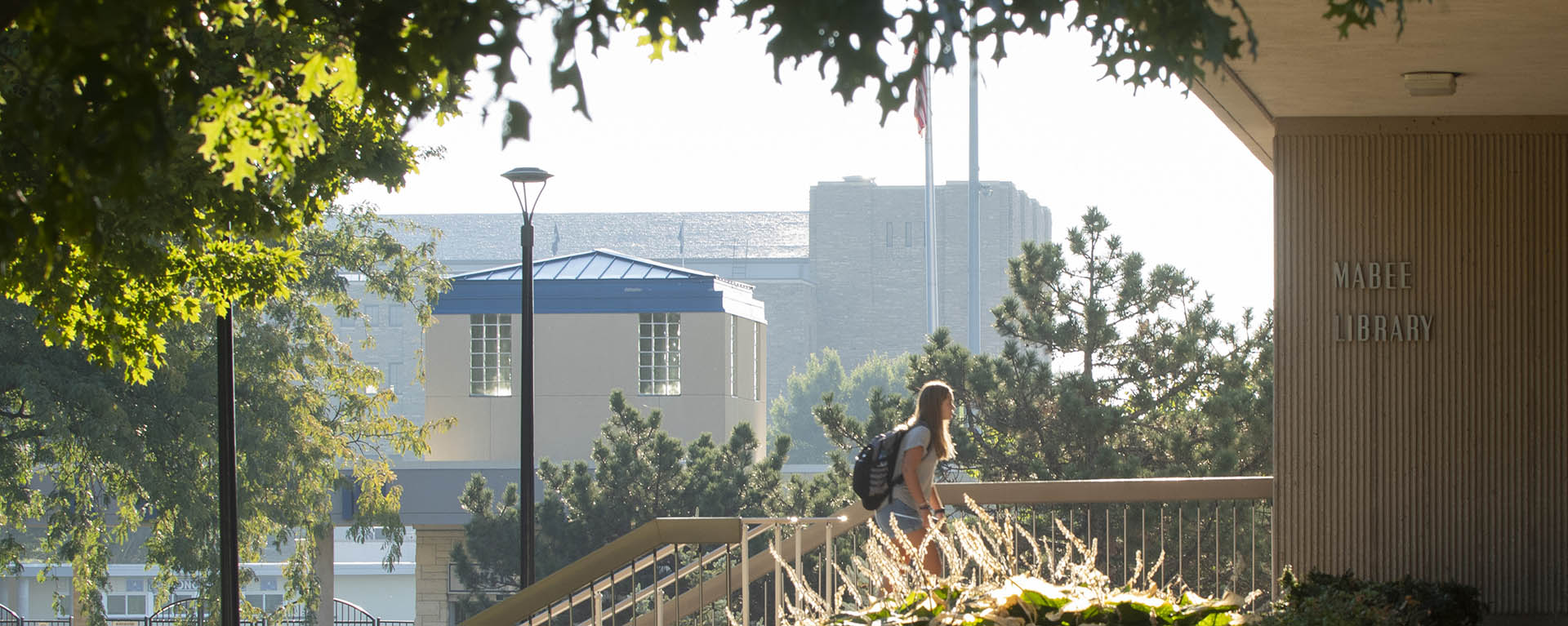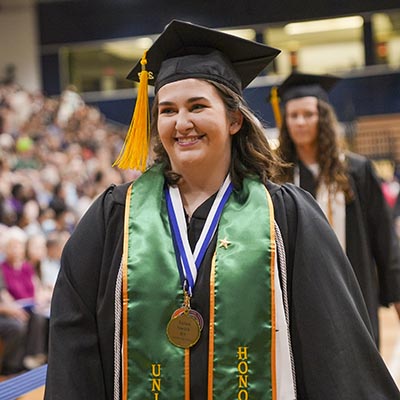
Add depth to your academic experiences
Students who are admitted to the Honors Program will take up to 8 courses for Honors credit and complete an Honors Thesis Project or a similar project (e.g. scholarly/creative WTE, or capstone project within major). To remain in good standing, Honors students need to maintain a cumulative college GPA of 3.5 and an Honors GPA of 3.0.
In Honors courses, students engage in active discussion and hands-on learning. With Honors contracts, students can make any course an Honors course while they tailor their degree to their interests and gain more faculty time.
Upcoming honors courses
Fall 2025 courses
Honors Program Levels and Graduating with Honors
Honors students can graduate with university honors at one of three levels of Honors credit by taking a specific number of Honors courses over their years at Washburn:
- Honors Associate - 12 Hours
- Honors Scholar - 18 Hours
- Honors Graduate - 24 Hours
All Honors students must complete an Honors Thesis Project or similar scholarly project (e.g., scholarly/creative WTE, or capstone project within major), regardless of tier.
Additionally, Honors students may graduate with the designation of Distinction or High Distinction based on the completion of an optional portfolio reflecting upon their intellectual development over the course of their career in Honors.
Make Any Course an Honors Course
Honors students can create contracts to make any course an honors course by working individually with a faculty mentor. Honors students work with professors in and outside of their major departments to enrich existing courses with innovative projects. Sample honors contract components:
- Shadow a professional in the field
- Conduct student-led research
- Edit a collection of student work
- Engage in additional discussion of course material
To learn more about this option, contact the Honors Program or visit the Honors Student Council section of D2L. To be considered for an Honors Contract, be sure to complete and submit the contract proposal within the first two weeks of the class.
Courses
Honors Courses include a special sections of The Washburn Experience (HN 101) and Advanced College Writing (EN 300) for Honors students, and special topics classes such as "Science and Technology for World Leaders," "Digital Story Telling" and "Kansas Legislative Experience."
EN 300 HN: Advanced College Writing – Honors Section (Eric McHenry)
Fulfills degree requirement for EN300. This course will include additional practice in writing, to assure proficiency in the techniques and tools of composition and will offer students the opportunity to order and articulate their knowledge. If you are planning on a career that relies upon written communication, or you love writing, try this section. This section is open only to Honors students and (by permission of instructor) students prepared for an Honors composition experience.
WE ONLY OFFER THIS HONORS COURSE IN SPRING SEMESTERS. IF YOU ARE PLANNING TO TAKE THIS COURSE IN THE NEXT YEAR, REGISTER NOW FOR AN HONORS VERSION.
HN 201 C: Ethical Responsibilities of Leadership (Michaela Saunders)
Survey of the fundamental ethical responsibilities of leadership; requires examination of obstacles to and opportunities for ethical leadership, an understanding of the cultural contexts of leadership and an articulation of a personal ethics statement as a foundation for applied ethics in the leadership process.
HN 201 XA: Beginning Non-Fiction Writing – Study Abroad to UK (Louise Krug and Melanie Burdick)
Have you ever wanted to try travel writing? Travel writing is a genre of creative nonfiction that involves documenting the author’s experiences, observations, and reflections during their journeys. Travel writing often has a narrative element to it that works to expose readers to situations and draw them into new worlds. In this Special Topics class, we will study the many elements of good travel writing, such as descriptive language, cultural insights, and personal narratives. We will experiment with writing different forms of travel writing, including blogs, essays, guidebooks, and newspaper articles. After the Spring 2026 semester is over, those who want to will journey to the United Kingdom to experience travelling first-hand and complete the capstone assignment of writing a travel narrative of their own.
TH 202 HNA: Acting I (Theodore Shonka)
Basic acting principles and practice involving physical, vocal, improvisatory, and text-based character analysis and performance techniques.
HN 202 B: Introduction to Community Studies (Michaela Saunders)
This course introduces students to the interdisciplinary academic discipline of community studies. Topics include the importance of understanding self and place, theories of community change, basic community-based research methods, and the importance of civic engagement.
HN 202 E/VA: Exploring Concepts of Leadership (Madeline Lambing)
This course provides a survey of leadership theories and introduction to the academic study of leadership using case studies and contexts of the leadership process; requires identifying personal leadership potential, articulation of a personalized leadership theory, and leadership concepts applied in a Campus Action Project.
HN 301 C: History in the Community (Kerry Wynn)
Students will work with a community partner to research and present historical narratives. Under faculty supervision, students will work in archives and libraries to discover local history, and then they will present their findings to the community partner in a form that serves the needs of that partner. Students will gain a greater understanding of research, history, and the way we shape the concept of history through public presentation.
HN 301 XA: United Nations Commission on the Status of Women (Sharon Sullivan)
In this course students will study the work of the United Nations and the UN Commission on the Status of Women, identify the Sustainable Development Goals, and critically examine how countries and non-governmental organizations are addressing these goals by attending the 68th U.N. Commission on the Status of Women in New York City as delegates and ad hoc delegates of NGO International Public Policy Institute. Short course. Travel course.
HN 302 B: Kansas Legislative Experience (Bob Beatty)
This course provides an analysis of the Kansas Legislature and Governor, along with other statewide offices and media, along with how they function within the governmental systems in the state of Kansas. Along with an in-depth study of a legislative session, the student will be required to attend legislative committee meetings, floor debates, gubernatorial press conferences, and conduct participant observation within a legislative or executive office.
HN 302 XA: Explore Japan – Study Abroad (Sangyoub Park)
In this study abroad course, we will use our sociological and anthropological perspectives to explore Japanese society and culture. Specifically we will:- Examine the transition to the economic powerhouse from the post-WWII period and what is ahead in Japan
- Visit cultural and historical sites and museums
- Attend local festivals
- Observe how Japan has tackled a shortage of labor and embraced immigrants
- Experience Japanese culture by engaging in hands-on activities
HN 392 A: Directed Readings (Kerry Wynn)
This section of 392 allows students to develop their own plan of study supervised by either the Dean of the Honors Program or another faculty member who has agreed to supervise a student’s independent study. Juniors are encouraged (but not required to enroll in this course prior to enrolling in Honors Thesis.
HN392 B: Mock Trial (Danielle Hall)
By participating in Mock Trial you will: Learn the basics of trial advocacy, and how to polish these basic skills so as to attain competitive success, Develop and sharpen your oral communication skills, Develop advanced research skills, Develop and sharpen your analytical ability, Learn through competition with your classmates and teams from other universities, and Be better prepared for law school.
HN 399 A: Honors Thesis (Kerry Wynn)
Like HN392A, this course is designed to be an independent study but with the focus being on fulfilling one of the requirements for completing the Honors Program – the thesis.
GET IN TOUCH WITH Honors
Honors
Plass Learning Resources Center, Room 2017
1700 SW College Ave.
Topeka, KS 66621
Connect
Phone: 785.670.2062
honors@washburn.edu
![]()
![]()

